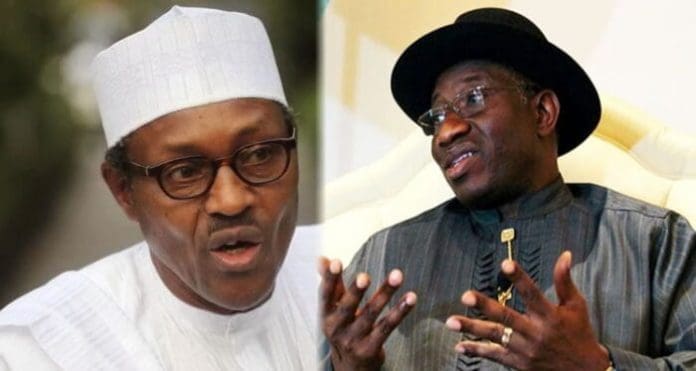Former President Goodluck Jonathan has clarified that he never accused the late President Muhammadu Buhari of having connections to Boko Haram, insisting his recent comments were misrepresented by media reports.
Through a statement issued by his spokesperson, Ikechukwu Eze, on Saturday, Jonathan addressed what he described as misleading interpretations of remarks he made during a book launch event in Abuja. The clarification comes after his Friday comments sparked controversy and drew sharp rebuttals from supporters of the late former president.
Jonathan spoke at the public presentation of “Scars: Nigeria’s Journey and the Boko Haram Conundrum,” a book written by retired General Lucky Irabor, former Chief of Defence Staff (CDS). During his speech, the former president recounted how Boko Haram insurgents once nominated Buhari to negotiate on their behalf with the federal government when his administration explored dialogue options with the terrorist group.
“At no time did Dr Jonathan suggest, imply, or insinuate that President Buhari had any connection with Boko Haram or that he supported the group in any form,” Eze stated in the clarification. The statement emphasized that Jonathan’s remarks were meant to illustrate the manipulative strategies employed by Boko Haram rather than make accusations against any individual.
According to Jonathan’s office, the former president was describing a well documented episode when various individuals and factions falsely claimed to represent the terrorist group. These imposters reportedly invoked names of prominent Nigerians as possible mediators without those individuals’ knowledge or consent, a tactic designed to sow confusion and exploit political divisions.
“Dr Jonathan’s remarks, made in the course of a broader discussion on Nigeria’s security challenges, were meant to illustrate the deviousness and manipulative strategies employed by Boko Haram in their early years,” the statement explained. His point centered on how the terrorist organization used respected public figures’ names to undermine public confidence in government efforts.
The clarification highlighted a rhetorical question Jonathan posed during his original comments. If Boko Haram genuinely wanted Buhari as their negotiator, why didn’t they expeditiously end their terrorist campaign when the retired general became president in 2015? This question, according to his team, demonstrates that Jonathan was questioning Boko Haram’s credibility rather than suggesting any actual connection between Buhari and the insurgents.
Garba Shehu, who served as spokesperson to Buhari, had earlier refuted Jonathan’s Friday remarks as false and politically motivated. The pushback from supporters of the late president prompted Saturday’s detailed clarification from Jonathan’s office.
“For the avoidance of doubt, Dr Jonathan recognizes that President Muhammadu Buhari, like every patriotic Nigerian, stood firmly against terrorism and was himself a target of Boko Haram violence,” the statement noted. It added that both former presidents, during their respective tenures, shared a commitment to restoring peace and stability to Nigeria.
The controversy emerged from discussions at the book launch, which examined Nigeria’s prolonged battle against Boko Haram insurgency. The 330 page volume by General Irabor offers insights into the complex dynamics of the conflict that has claimed tens of thousands of lives since 2009.
Jonathan served as Nigeria’s president from 2010 to 2015, a period when Boko Haram escalated its attacks significantly. His administration faced sustained criticism over its handling of the insurgency, particularly following the April 2014 abduction of 276 schoolgirls from Chibok, Borno State. At the book launch, Jonathan described the Chibok abduction as a scar that would remain with him forever.
Buhari succeeded Jonathan in 2015, campaigning partly on promises to defeat Boko Haram. Despite military gains during his eight year presidency, the insurgency persisted, though with reduced capacity in some areas. Buhari himself survived a Boko Haram attack in July 2014 when insurgents bombed a location in Kaduna shortly after he left, killing at least 82 people.
The clarification from Jonathan’s office emphasized that his original comments were not intended as accusations but as observations about terrorist propaganda tactics. Boko Haram’s history includes numerous instances of false claims and deceptive communications designed to create political controversy and distract from counter insurgency efforts.
“His comments were therefore an illustration of the group’s duplicity, not an accusation against the late former president or any individual, for that matter,” Eze’s statement concluded. Jonathan’s team called on Nigerians to disregard misinterpretations of his remarks, reaffirming his commitment to peace, unity, and strengthening democratic values.
The incident reflects ongoing sensitivities around Nigeria’s security challenges and how different administrations have addressed them. As the country continues battling various forms of insecurity, including banditry, kidnapping, and remnants of Boko Haram activity, discussions about past approaches remain politically charged.
Source: newsghana.com.gh











